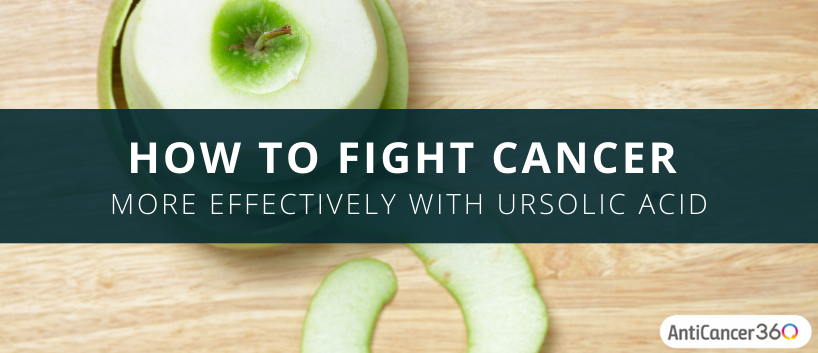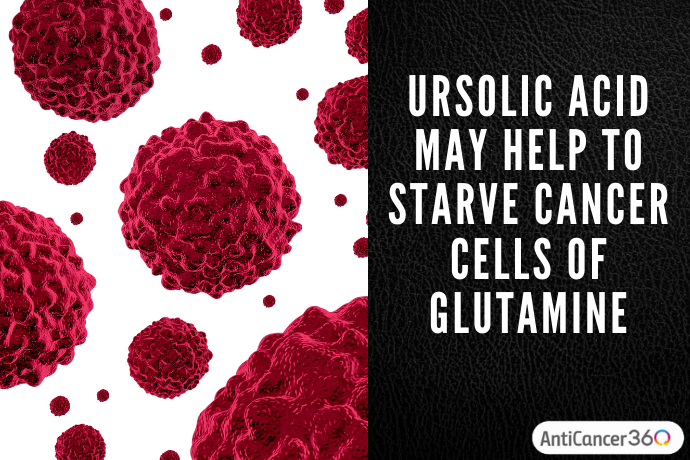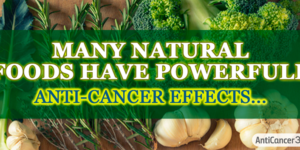When you’re fighting challenging and late-stage cancer, it’s essential to support your body in every way possible. One of these strategies involves using natural substances that can help you fight cancer from every angle, in addition to your other treatments. And many of these anticancer nutrients come from the foods that we eat.
“An apple a day keeps the doctor away.” We have all heard this old adage… but can apples help fight cancer?
Research shows that adults who eat an apple a day take significantly fewer prescription medications than adults who do not eat apples daily [1]. Regardless, nutrient-dense diets that include apples, among other fruits and vegetables, have been repeatedly linked to anticancer effects [2].
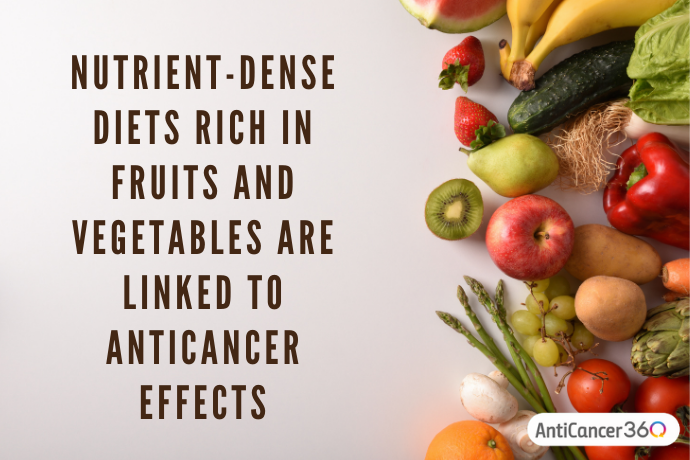
Today we’ll show you what the research says about ursolic acid, a powerful nutrient found in apples, and how it can help you fight cancer.
What is Ursolic Acid?
Apples contain dietary fiber, flavonoids, and, especially in the peel, a compound known as ursolic acid. Also, ursolic acid is found in rosemary leaves, marjoram, lavender, and thyme, as well as in some flowers and berries. It is also a component of the Ayurvedic herb known as holy basil or tulsi [3].
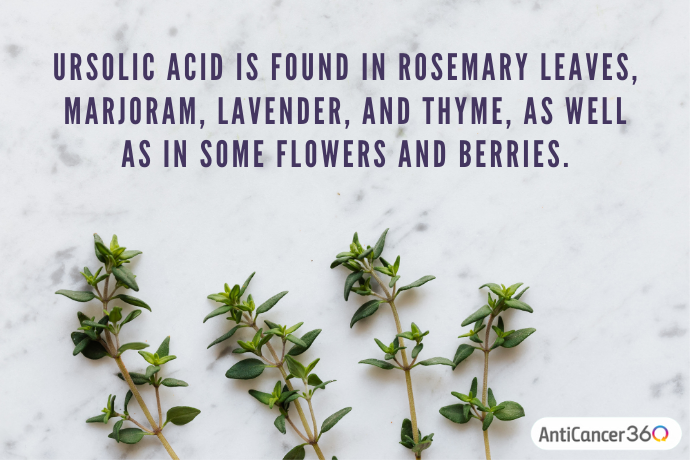
Ursolic acid belongs to a group of molecules known as the triterpenes, which refers to their chemical structure. Triterpenes are responsible for the pharmacological effects of many medicinal plants used for immune diseases. They have been linked to many potential health benefits, including anti-inflammatory, antimicrobial, and antitumor effects [4].
So now, let’s take a closer look at the health benefits of ursolic acid and how it can help you succeed against cancer.
Cancer Metabolism Suppression: How to Starve Cancer with Ursolic Acid
Our bodies, and all living things, are made up of tiny cells that can be seen under a microscope. In our cells, nutrients are metabolized into energy so that we can do things, live, and grow.
Cancer metabolism is the process by which cancer cells take in nutrients and make energy for their survival. The exploration of how to starve cancer… without starving our healthy cells… is an ongoing goal of cancer research.
In this sense, we aim to prevent sugar, fats, and proteins from nourishing cancer cells. This strategy weakens cancer cells to make them more vulnerable to cancer treatments. So this is where many plant nutrients, like ursolic acid, have shown their usefulness in blocking vital mechanisms of cancer metabolism.
Ursolic Acid May Regulate Blood Sugar Levels and Help Prevent Cancer
Since ursolic acid may increase the level of antioxidants, it may be useful in preventing or fighting cancer. Antioxidants are molecules that combat free radicals in your body. Free radicals are compounds that, at high levels, can cause damage to cells and DNA. Oxidative stress occurs when antioxidants and free radicals are out of balance. Oxidative stress is linked with multiple illnesses, including diabetes, heart disease, and cancer.
Tumor cells typically require high blood sugar (glucose) uptake and metabolism to satisfy their high-energy needs. Glycolysis is the first step in the breakdown of sugar to extract energy.
Researchers have found that ursolic acid targets the glycolysis pathway in breast cancer cells, leading to apoptosis (cell death) and autophagy [6]. Autophagy literally means “self-eating” and is the body’s way of eliminating damaged cells to reconstruct new ones.
Interestingly, ursolic acid reduces the number of glycolysis enzymes present in breast cancer cells. Decreased levels of energy, known as ATP, have also been observed in laboratory studies of bladder cancer and glioma cells [5].
Ursolic Acid May Disrupt Cancer Metabolism of Glutamine
Cancer cells are continually adapting, and they need sources of energy to survive. If a cancer cell is starved of sugar, it redirects to sapping other energy sources like protein and fat.
Amino acids are the building blocks of proteins that have numerous valuable cell functions. Glutamine is the most abundant amino acid in our bodies, and tumor cell growth demands high glutamine levels. Finding ways to interfere with glutamine metabolism in cancer cells is a logical objective of cancer research… and ursolic acid helps with this.
In a 2017 study of prostate cancer in mice, the effects of ursolic acid were evaluated individually and in combination with curcumin and resveratrol. The researchers found that ursolic acid prevented glutamine uptake by prostate cancer cells, which slowed tumor growth. So, preventing the uptake of glutamine by ursolic acid actually starved the prostate cancer cells to death [7].
This study also demonstrated that combining ursolic acid with curcumin or resveratrol led to synergistic effects on reducing prostate tumors’ size. Two substances are synergistic when combined to produce more significant results than the sum of their separate effects: “2+2=5.”
When comparing untreated mice versus mice receiving one of the individual compounds, the treated mice had smaller tumors. However, the mice treated with the combination of ursolic acid with either curcumin or resveratrol yielded by far the best results in reducing tumor size [7].
These researchers also noted that the ursolic acid, curcumin, and resveratrol didn’t cause any dangerous side effects in the mice [7].
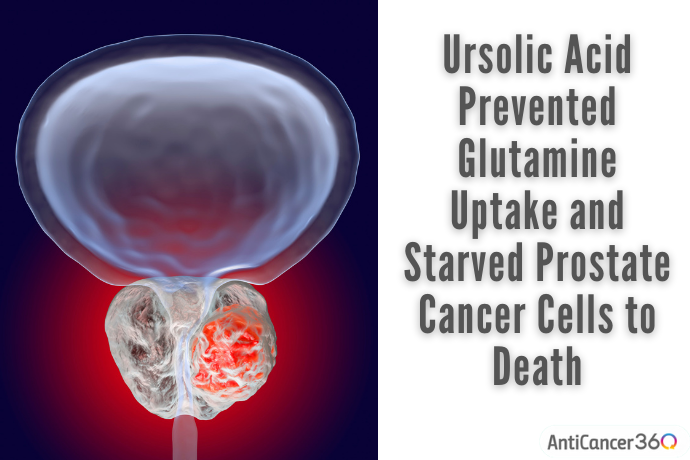
Ursolic acid also intervenes in another glutamine-related metabolic pathway known as mTOR (mammalian target of rapamycin). mTOR is an enzyme that is recognized as a crucial link between nutrient availability and metabolic control [8].
Scientists have discovered that the mTOR cell-signaling pathway is activated during different cell processes, such as tumor formation and insulin resistance, and becomes uncontrolled in cancer and type 2 diabetes. So it makes sense that many cancer researchers are focused on strategies to minimize mTOR activity in tumor cells.
Several studies have shown that ursolic acid may decrease mTOR activity [7].
Laboratory evidence suggests that ursolic acid decreases the levels and activity of some enzymes involved in glutaminolysis. Glutaminolysis is the breakdown of glutamine into smaller parts, which are used to make cellular energy.
So, under conditions of glucose and glutamine deprivation, cancer cells start to run low on energy (ATP). When cells run down on ATP, they activate an enzyme called AMPK. Research shows that ursolic acid also activates AMPK. This ability to activate AMPK may explain how ursolic acid decreases mTOR activity and ultimately contributes to cancer cell death [7].
Antiangiogenic Effect of Ursolic Acid
Besides the ways ursolic acid interferes with cancer cell metabolism, it is also known for its antiangiogenic effects. Angiogenesis is the formation of new capillaries from preexisting blood vessels. In other words, it’s how tumors grow their blood supply. Over the last several decades, many antiangiogenic drugs and compounds have been developed based on this concept of choking off the blood supply to the tumor.
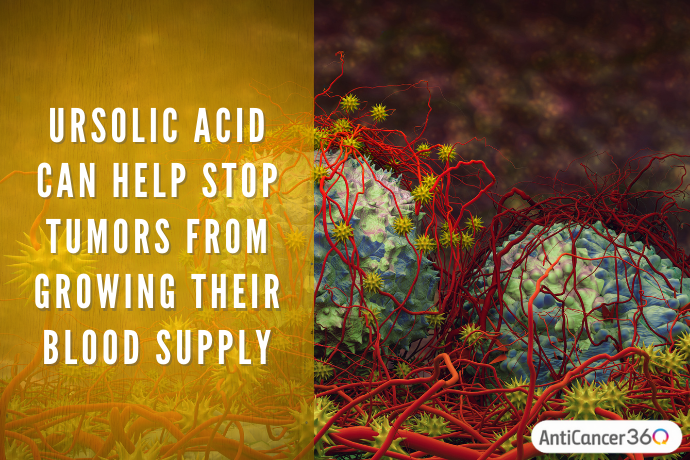
In many laboratory and animal studies, ursolic acid has been shown to stop new capillary formation in cancer cells. The levels of vascular endothelial growth factor (VEGF) and proinflammatory cytokines were significantly reduced in ursolic acid-treated mice compared with untreated mice [9].
VEGF is a signaling molecule sent out to recruit the cells that form new blood vessels. Research suggests that ursolic acid blocks specific cellular pathways in blood vessel cells, which in turn suppresses cellular changes that usually precede angiogenesis [10].
Animal studies of ursolic acid have shown significant dose-dependent decreases in VEGF levels and reactive oxygen species (ROS) in liver cancer cells [11].
Aggressive Integrative Approach with Ursolic Acid
Some researchers point out that the concentrations of ursolic acid obtained in laboratories are higher than what can be realistically absorbed in the human body. However, combining ursolic acid with other natural products, chemotherapy, or radiation may be a potential strategy to overcome its limited absorption and improve therapy outcomes.
In laboratory studies of cancer cells, ursolic acid has been found to enhance the anticancer effects of several chemotherapy drugs, including 5-fluorouracil, bortezomib, capecitabine, cisplatin, cyclosporine, doxorubicin, and gemcitabine [12].
Research also suggests that ursolic acid may make some cancer cells more sensitive or vulnerable to chemotherapy. This includes cancers of the bladder, colon, liver, lung, ovary, pancreas, prostate, and skin [12].

It’s also important to note that chemosensitization with ursolic acid is observed only in cancer cells, but not in adjacent healthy cells. By supplementing chemotherapy with naturally safe ursolic acid, it may be possible to improve chemotherapy tolerability by reducing the dose necessary, and without sacrificing results [13].
Ursolic acid may also help against cancer by affecting a cancer-related mechanism called NF-κB. The activation of NF-κB can lead to treatment-induced tumor cell resistance. NF-κB (nuclear factor kappa light chain enhancer of activated B cells) is a family of enzymes that regulate many critical cellular processes, including inflammatory responses, cellular growth, and apoptosis (programmed cell death).
Laboratory studies of tumor cells show that ursolic acid exerts its chemosensitizing and radiosensitizing effects by helping to inhibit NF-κB [14].
Now, aside from chemosensitization (i.e., making cancer cells more sensitive and vulnerable to chemotherapy,) ursolic acid can have a similar effect with radiation therapy.
The use of “radiosensitizing agents” can help overcome radiation resistance by reducing the necessary dose of radiation and its side effects. Studies have shown that ursolic acid is a safe and potentially useful radiosensitizing agent [13] [14].
How To Use Ursolic acid: Dosages, Side Effects, and Precautions
Dosage
On average, an apple, with its peel, contains approximately 50 mg of ursolic acid. Taking a daily ursolic acid supplement can help to ensure a consistent intake of ursolic acid. Ursolic acid supplements are available in powder and capsule forms [15].
The usual dosage of ursolic acid supplementation is between 150 and 450 mg per day and is usually divided into two or three doses throughout the day [16] [17].
Side Effects
Ursolic acid is generally well-tolerated and has a low risk of causing severe side effects. In human studies, the most frequent complaints were mild and included nausea, diarrhea, and skin problems [17].
Animal studies in rats and goats have linked ursolic acid to a possible decrease in sperm motility and male fertility. This effect has not been observed in humans [18] [19].
Interactions with Drugs and Supplements
There are no known drug interactions reported with ursolic acid.
The absence of interactions in the available literature does not necessarily mean that no interactions exist. There could be unknown potential drug interactions with ursolic acid, especially with chemotherapy and other cancer treatments.
You must consult with your doctor or pharmacist before including any supplements in your program.
Nevertheless, you can see that there can be many potential benefits to adding a natural dietary supplement like ursolic acid to your overall anticancer program.
And ultimately, when using the “Aggressive Integrative Approach” to cancer, the goal is to fight cancer from every possible angle. This approach includes integrating natural supplements to fight cancer based on available evidence, despite limited human data, and to do it in a safe way that won’t interfere with your oncology treatments.
Will Ursolic Acid Strengthen Your Personal Battle with Cancer?
How are you approaching your overall treatment plan? Are you ready to consider incorporating any natural supplements? Or are you already taking ursolic acid? If so, how have you felt since you started it? We would love to hear from you! Share your experiences in the comments below.
If you’re interested in using an Aggressive Integrative Approach for your case, you can learn more about our program by watching one of our free online webinars.
Please discuss the risk-versus-benefit potential with your healthcare professional before starting any natural supplement, including ursolic acid.
Are You A Candidate For Our Program?
If you’d like to learn more about the AntiCancer360 approach and see if we can help you… please watch our free online webinar to learn more about our approach. Then at the end, you’ll be able to schedule a free call with someone from our team so that we can discuss your case in more detail.
Citations
Dr. Patricia Weiser is one of AntiCancer360’s consultant pharmacists, science advisors, and medical writers. Her expertise helps us create safe herbal and supplement combinations and avoid potential drug interactions.
Patricia is a graduate of the University of Pittsburgh and a licensed pharmacist. She has clinical experience in both community and hospital pharmacy. She is passionate about integrative and preventative care and strives to empower her patients to take an active role in their health.

